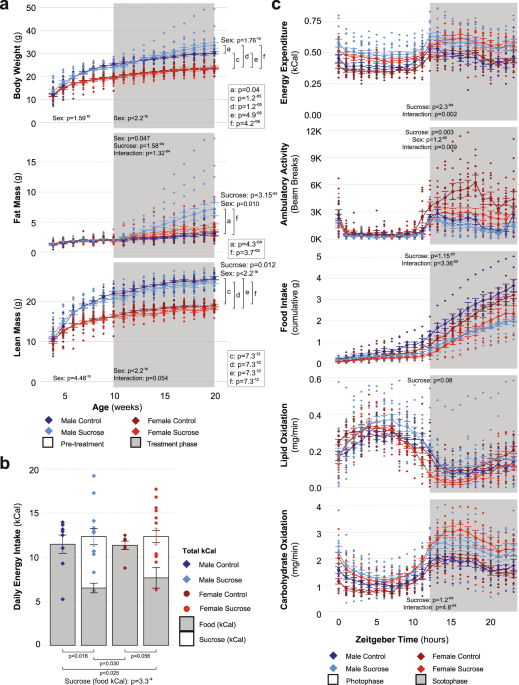Mito
Member
- Joined
- Dec 10, 2016
- Messages
- 2,554
Highlights
Abstract
Objective
Although it is widely accepted that obesity results from an imbalance of energy intake and expenditure, the mechanisms underlying this process and effective strategies for prevention and treatment are unclear. Growing evidence suggests excess consumption of sugar may play an important role, yet we showed previously in mice that consuming up to 30% of calories as sucrose in the diet had no impact on weight regulation. Since in humans consumption of sugar-sweetened beverages has been widely implicated, we investigated whether the mode of ingestion (solid or liquid) had different impacts on body weight regulation and glucose homeostasis.
Methods
Dietary sucrose was delivered in solid (as part of a standard pelleted rodent chow) and liquid (in drinking water) to C57BL/6 mice for 8 weeks. Body weight, body composition, energy intake, and expenditure were monitored, and glucose and insulin tolerance tests were given. Expression of sweet taste receptors on the tongue and glycogen and fat contents of the liver were also measured.
Results and conclusions
Consumption of sucrose-sweetened water, but not equivalent levels of solid sucrose, led to body fat gain in C57BL/6 mice. Glucose intolerance was positively correlated to body fatness rather than sucrose intake. Our data support the suggestion that consumption of liquid sucrose may be an important contributor to dysregulation of body weight and related metabolic syndromes.
Impact of dietary sucrose on adiposity and glucose homeostasis in C57BL/6J mice depends on mode of ingestion: liquid or solid - ScienceDirect
- Sucrose-sweetened water intake was associated with increased energy consumption and greater body fat gain in C57BL/6 mice.
- The same level of sucrose in a solid diet did not lead to higher energy intake or elevated body weight and fatness.
- Elevated adiposity due to sucrose-sweetened water intake was correlated with impairment of glucose homeostasis and insulin resistance.
- Glucose homeostasis and insulin resistance were related to adiposity and the mode but not the level of sucrose intake.
Abstract
Objective
Although it is widely accepted that obesity results from an imbalance of energy intake and expenditure, the mechanisms underlying this process and effective strategies for prevention and treatment are unclear. Growing evidence suggests excess consumption of sugar may play an important role, yet we showed previously in mice that consuming up to 30% of calories as sucrose in the diet had no impact on weight regulation. Since in humans consumption of sugar-sweetened beverages has been widely implicated, we investigated whether the mode of ingestion (solid or liquid) had different impacts on body weight regulation and glucose homeostasis.
Methods
Dietary sucrose was delivered in solid (as part of a standard pelleted rodent chow) and liquid (in drinking water) to C57BL/6 mice for 8 weeks. Body weight, body composition, energy intake, and expenditure were monitored, and glucose and insulin tolerance tests were given. Expression of sweet taste receptors on the tongue and glycogen and fat contents of the liver were also measured.
Results and conclusions
Consumption of sucrose-sweetened water, but not equivalent levels of solid sucrose, led to body fat gain in C57BL/6 mice. Glucose intolerance was positively correlated to body fatness rather than sucrose intake. Our data support the suggestion that consumption of liquid sucrose may be an important contributor to dysregulation of body weight and related metabolic syndromes.
Impact of dietary sucrose on adiposity and glucose homeostasis in C57BL/6J mice depends on mode of ingestion: liquid or solid - ScienceDirect

